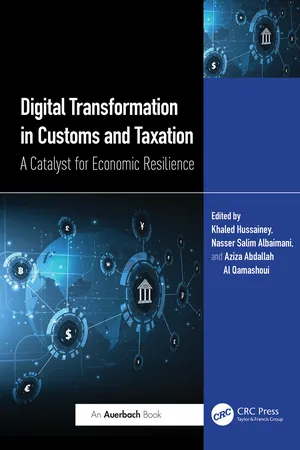
Digital Transformation in Customs and Taxation
A Catalyst for Economic Resilience
- English
- ePUB (mobile friendly)
- Available on iOS & Android
Digital Transformation in Customs and Taxation
A Catalyst for Economic Resilience
About this book
The landscape of customs and taxation is experiencing a significant shift, driven by digital technologies and innovative frameworks. This transformation redefines how nations enforce compliance, collect revenues, and engage in international trade. With deepening digitalization, countries are adopting such advancements as AI, blockchain, and machine learning to tackle evolving challenges in the tax and customs sector.
Some of the highlights discussed by this book include:
- Customs reform and modernization
- Challenges facing excise and customs tax administration in the digital era
- AI's impact on customs and taxation
- AI and machine learning in tax fraud evasion detection and compliance
- How AI improves the efficiency of accounting software to facilitate functioning taxes and customs authorities
- Blockchain applications in value-added tax collection
Digital Transformation in Customs and Taxation: A Catalyst for Economic Resilience addresses the concerns, difficulties, trends, and opportunities related to digital transformation in customs and taxation. It provides knowledge and insights to navigate this evolving landscape. It presents ways to enable effective and efficient customs and tax services in the digital economy. To discuss the problems and nuances of incorporating digital solutions into customs and tax systems, the book looks at how industries employ technology to improve efficiency, effectiveness, and compliance. It offers practical approaches and solutions for dealing with the challenges that arise when implementing digital transformation projects in this industry. Real-world case studies, examples, and best practices illustrate how to efficiently use digital tools and platforms to improve services.
Filled with insight into how digital transformation can redefine traditional practices, enhance efficiency, and build resilient systems for future demands, this book is a resource for policymakers, academics, and professionals seeking to innovate customs and tax administration.
Frequently asked questions
- Essential is ideal for learners and professionals who enjoy exploring a wide range of subjects. Access the Essential Library with 800,000+ trusted titles and best-sellers across business, personal growth, and the humanities. Includes unlimited reading time and Standard Read Aloud voice.
- Complete: Perfect for advanced learners and researchers needing full, unrestricted access. Unlock 1.4M+ books across hundreds of subjects, including academic and specialized titles. The Complete Plan also includes advanced features like Premium Read Aloud and Research Assistant.
Please note we cannot support devices running on iOS 13 and Android 7 or earlier. Learn more about using the app.
Information
Table of contents
- Cover
- Half-Title Page
- Title Page
- Copyright Page
- Table of Contents
- Preface
- List of Contributors
- Chapter 1 Customs Duties, Taxes, Procedures, Clearance Enforcement, and Compliance Case Study in Oman
- Chapter 2 Toward a Customs Reform and Modernization
- Chapter 3 The Basics of Customs and Taxation: An Overview
- Chapter 4 How Does VAT Influence Oman Economy: The Behavior of Omani Customers
- Chapter 5 Challenges Facing Excise and Customs Tax Administration in the Digital Era: Current Practice, Prospects, and Tailored Approaches to the Implementation of New Technology
- Chapter 6 Impact of Artificial Intelligence on Customs and Taxation
- Chapter 7 Artificial Intelligence (AI) and Machine Learning (ML) in Tax Fraud Evasion Detection and Compliance
- Chapter 8 The Role of Digital Advancement and Artificial Intelligence in Improving the Efficiency of Accounting Software to Facilitate Optimal Tax Procedures and Prevent Legal Appeals
- Chapter 9 Taxation of the Digital Economy in Kenya: Challenges and Possible Solutions
- Chapter 10 The Effect of Egyptian Customs’ Digital Transition on Public Revenues
- Chapter 11 International Trade Agreements, Tariffs, and Trade Barriers: The Situation with China and the USA
- Chapter 12 A Review of Blockchain Applications in Value-Added Tax Collection
- Chapter 13 Artificial Intelligence and Impact on Customs and Taxation
- Index